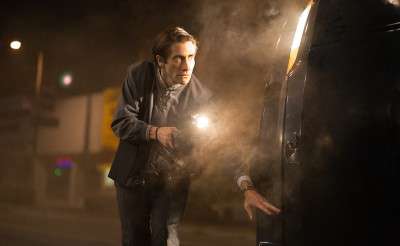“Nightcrawler” embarks on a journey through darkness, even as it’s set in the city of eternal light pollution, Los Angeles. The camera lingers on the LA monuments, resting on landmarks chopped up by shadow, frequently landing on shots of large broadcast towers dominating the horizon: the ever-present news culture dominating thought.

It’s a concept that endures throughout the film, released Friday, which serves as a powerful study on human ambition in an increasingly bankrupt society. It focuses on the city through a lens — and on life through a lens — that what is most important is less what is shown, and more what will (or can) be.
“On TV, it looks so real,” says Jake Gyllenhaal as Louis Bloom, a scrap-thief-turned-freelance-cameraman for the TV news, with a quivering chin and slight vocal break. It’s a rare show of emotion from him in a tightly controlled “Nightcrawler” performance.
Gyllenhaal uses graceful hand gestures and a quick, lined smile that never quite reaches his large unblinking eyes. As Louis, he channels the brightly innocent voice that served him well as a young teenager in “October Sky” or even “Donnie Darko,” but pairs it with a horrifyingly gaunt visage, a skull atop vulture-hunched shoulders. It’s a potent posture for the role of a talented, ambitious oddball with absolutely no moral qualms.
In Bram Stoker’s “Dracula” the most frightening character is Renfield, the psychiatric patient who devours living things — first by spiders, then moving up to mammals — all to gain the virility of life. There are shades of Renfield in Louis. He starts from humble beginnings, desperate for employment and a way up the ladder of power.
After encountering “nightcrawler” Joe Loder (Bill Paxton), one in a group who records violent crimes and sells the video for a profit, Louis sets his sights on filming crime scenes for the news. He gains his first soul, Rick (Riz Ahmed), a near-illiterate high school graduate who works for $30 a night. Louis’s eyes gleam as the one employee comes aboard, glowing with the newfound power over one person.
In that quest for power, Louis knows no lines, crossing criminal tape, crowding officers and countering with a wide-eyed professional retort. Louis’s modus operandi is politeness and an off-putting business-like nature, whether being caught in a criminal act or blackmailing shark-like news director Nina Romina (Rene Russo) for sex. Louis interacts with other characters at an eerie remove, cloaked in corporate buzzwords and a knack for Internet-mined knowledge.
Each time he collects a new soul — whether in his domineering relationship with Rick, his abusive ownership of Nina or the myriad of victims’ bodies he collects with the hungry eye of his camcorder — the victory on his face is clear. The first time he beats police to an accident, the music softens and his smile widens in taut excitement, a grinning death’s head above a gruesome scene.
What “Nightcrawler” truly indicts is less the lack of integrity presented by Louis, but more the lack of integrity in a media setting that allows him to flourish. “Nightcrawler” delves into the disgusting heart of sensationalist news environment. Nina revels in the tawdriness of the media.
It might be Loder, his competitor, who first teaches Louis, “If it bleeds it leads,” but it’s Nina who paints the broadcast landscape clearly: “Urban crime creeping into the suburbs” — journalism that preys on fear and titillation from an onslaught of base stereotypes and graphic imagery. Worse is when we realize who feeds the monster, who enables creatures like Louis to succeed. It’s us; it’s society.
It’s the viewer that rewards the lowest common denominator of thought. The people watching this film are the ones indulging the gross immediacy of the need-it-now and need-it-big mentality. First-time director Dan Gilroy, who wrote the script for this movie and big budget macho films like “Real Steel” and “The Bourne Legacy,” skillfully dishes out a large serving of consumeristic hubris for the viewing public.
Gilroy almost depicts Louis as heroic, but manipulates each action to reveal the misguided nature of this cultural encouragement. The many car chases in the movie, a tool used by characters such as James Bond and Jason Bourne to raise stakes and entice the viewer, are here played out in chilling, dangerous realism. Alpha male posturing over women, used in those self-same films for testosterone-fueled admiration, is accurately shown as a terrifying act of abuse.
“Nightcrawler” effectively feeds us the beloved antihero, but for once highlights the dark, disgusting nature of the meal.






























































































































